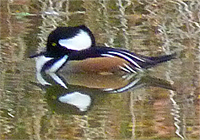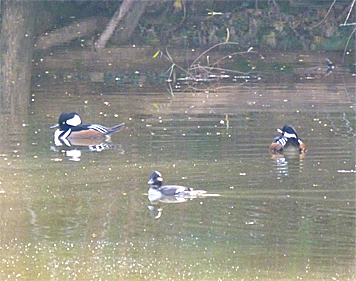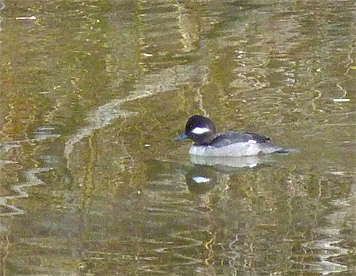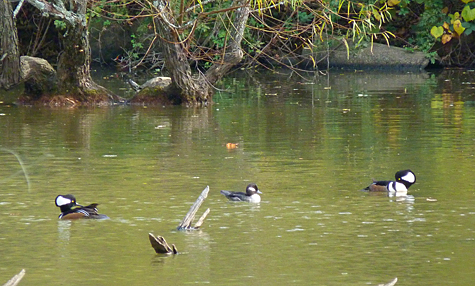
Hooded mergansers are back in the Wetlands. A handful of the fish eating waterfowl showed up over the weekend. I counted three males and a female this morning (11/7).
While taking photos of the mergs, and just plain watching the birds swim about this morning, out of the corner of my eye I noticed a small, dark duck come in for a landing. I assumed it was a female merg coming in to join the others and went back to photoing the handsome male mergs.
Seconds later the little duck swam across the digital screen of my camera’s viewfinder. It was a bufflehead! There may have been buffleheads in the Wetlands previous to today’s encounter (11/7/14), but I hadn’t seen them. This is the first I’ve recorded one here.

Buffleheads, are small ducks. They’re not uncommon on the Piedmont of North Carolina in fall and winter. A trip to any of the local lakes or reservoirs should support that fact.
They are diving ducks and mostly consume aquatic invertebrates, mollusks and crustaceans. I’m assuming our little friend is finding plenty of backswimmers, damselfly and dragonfly larvae, and other aquatic insects in its frequent dives beneath the water’s surface.

The visiting bufflehead looks to be a young male. Adult males become white on the flanks and sides, black on their backs and their heads take on a green/purple iridescence with a large white area along the rear and central portion of the head. Females look much like the bird in the photos. I can detect a slight purple sheen to this bird’s head. I think it’s a male.

The little bufflehead is sticking fairly close to the mergansers. I’m sure that’s why the bird dropped in to begin with, he saw the mergansers and thought the pond worthy of investigation. I hope it pays off for the duck.
I wonder though, if and how it may have gotten separated from its flock. These ducks tend to migrate in small flocks. Perhaps the snow to our north and west and heavy rain a few days back was the culprit. I wish him luck.